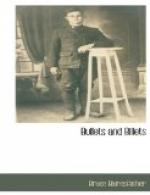Our servants started in to put things right for us, get our baggage there, and so on, whilst I went off to see to billets for the machine-gun section. I had got them a pretty good barn, attached to the farm I first called at, but I wanted to go and see that it was really large enough and suitable when they had all got in and spread themselves. I found that it did suit pretty well. The space was none too large, but I felt sure we wouldn’t find a better. There was a good field for all the limbers and horses adjoining, so on the whole it was quite a convenient place. The section had already got to work with their cooking things, and had a fire going out in the field. Those gunners were a very self-contained, happy throng; they all lived together like a family, and were all very keen on their job.
I returned to my cottage to see how things were progressing. My man had unrolled my valise, and put all my things out and about in the bedroom. I took off all my equipment, which I was still wearing, pack, haversacks, revolver, binoculars, map case, etc., and sat down in the kitchen to take stock of the situation. I now saw what the family consisted of; and by airing my feeble French, I found out who they were and what they did. The woman who had come to the door was the wife of a painter and decorator, who had been called up, and was in a French regiment somewhere in Alsace.
Another girl who was there was a friend, and really lived next door with her sister, but owing to overcrowding, due to our servants and some French relatives, she spent most of her time in the house I was in.
The owner of the place was Madame Charlet-Flaw, Christian name Suzette. The other two girls were, respectively, Berthe and Marthe. Ages of all three in the order I have mentioned them were, I should say, twenty-eight, twenty-four, and twenty. The place had, I found, been used as billets before. I discovered this in two ways.
Firstly: On the mantelpiece over the old stove I saw a collection of many kinds of regimental badges, with a quantity of English magazines. Secondly, after I had been talking for some time, Suzette answered my remarks with one of her stock English sentences, picked up from some former lodgers, “And very nice too,” a phrase much in vogue at that time.
The transport officer, who had been out seeing about something or other, soon returned, and with him came the regimental doctor, who had got his billets all right, but had come along to see how we were fixed up. A real good chap he was, one of the best. All six of us now sat about in the kitchen and talked over things in general. We were a very cheery group. The transport officer, doctor and myself were all thoroughly in the mood for enjoying this ten days’ rest. To live amongst ordinary people again, and see the life of even a village, was refreshing to us. We had a pretty easy afternoon, and all had tea in that kitchen, after which I went




